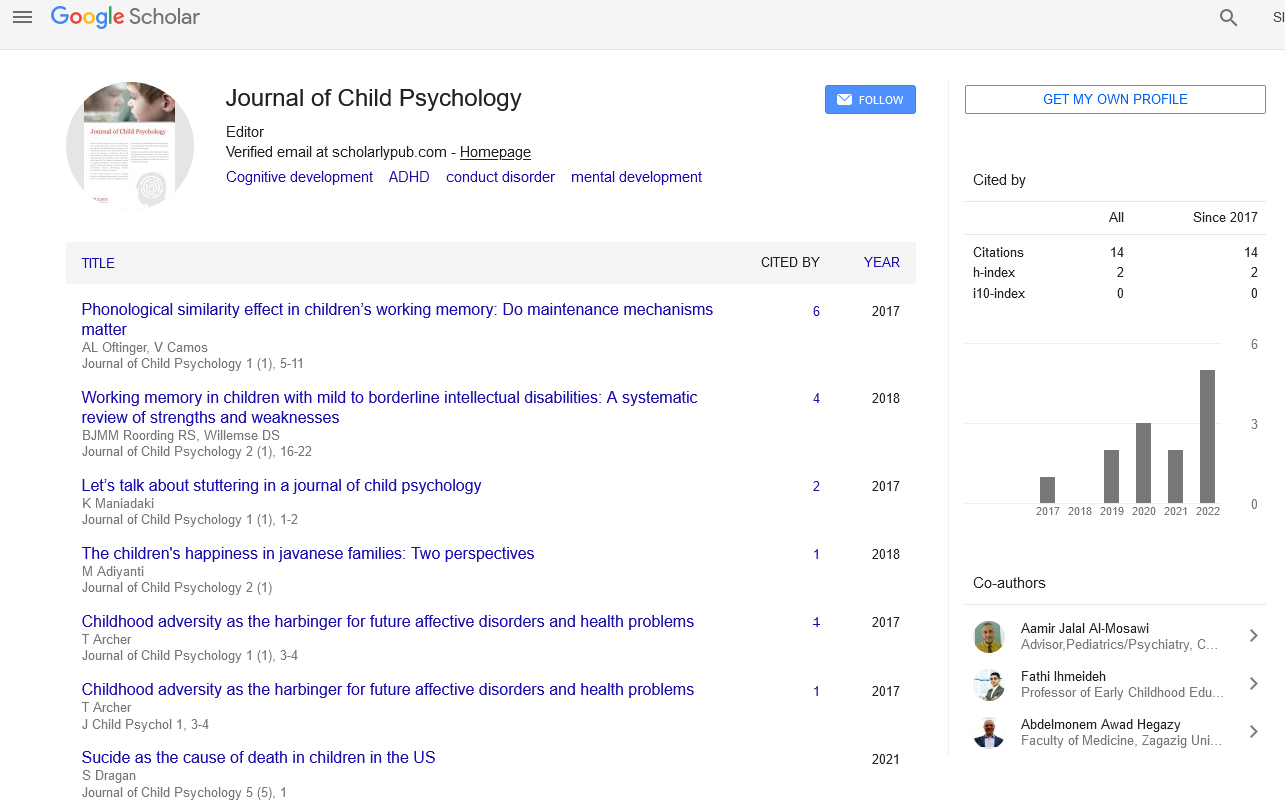Negative impact of antibiotic exposure in the cognitive development of children
Received: 27-Jul-2021 Accepted Date: Aug 10, 2021; Published: 17-Aug-2021
This open-access article is distributed under the terms of the Creative Commons Attribution Non-Commercial License (CC BY-NC) (http://creativecommons.org/licenses/by-nc/4.0/), which permits reuse, distribution and reproduction of the article, provided that the original work is properly cited and the reuse is restricted to noncommercial purposes. For commercial reuse, contact reprints@pulsus.com
Commentary
The third significant development in infants involves the brain. Colonisation of the infant’s gut microbiota is assumed to start before birth. Infancy represents a time when the composition of the microbiota is rapidly changing because the infant’s gut is influenced by factors like method of delivery and feeding practices. At an equivalent time as gut maturation and microbiota stabilisation are occurring, the central nervous system is additionally rapidly developing, and therefore the bidirectional pathways between the gut and brain are being established. Thus, there are neurodevelopmental windows during which the microbial composition of the gut may influence brain development and thus function.
Antibiotics are widely utilized in children under the age of 24 months to treat infections. Additionally to increasing concern about antibiotic resistance, there’s growing concern about the potential negative impact of antibiotics on the gut microbiota. Antibiotic exposure early in childhood could adversely affect important areas of brain development liable for psychological and social development. The new research findings imply reducing antibiotic use or preferring alternative drugs when possible to delay or prevent neurodevelopment problems.
Penicillin and related medicines (like ampicillin and amoxicillin) are the foremost widely used antibiotics in children worldwide. The average child gets three courses of antibiotics before attaining the age of 2. The scenario is even worst in the developing and under-developing countries where antibiotics are prescribed irregularly.
The laboratory study, published suggests that penicillin modifies the microbiome (beneficial microorganisms that stay in and on our bodies) also as gene expression, which allows cells to respond and adapt to its changing environment, in important areas of the brain, responsible for cognitive development. This study shows a correlation between altering the microbiome and changes within the brain that ought to be further explored. A study on mice has found that low dose penicillin alters the gut microbiota of infant mice, increases cytokine expression within the frontal region of the brain and alters behaviour with signs of unsociability. In a significant observation, antibiotic exposed male mice showed changes in anxiety like behaviour on the elevated plus maze.
Evidence links reactions within the intestinal tract with signalling to the brain, called gut-brain-axis. If this pathway is disturbed, it can cause permanent altering of the brain’s structure and performance and possibly cause neuropsychiatric or neurodegenerative disorders in later childhood or adulthood.
In a Cohort study, infants as participants were then assessed at 3, 6, 12, 18 and 24 months and at 4,6 and 11 years for allergy outcomes. Cognitive, behavioural and mood outcomes were assessed when children were 11 years aged using parent-report, self-report and individually administered measures. Antibiotic use within the first 2 years of life was assessed using reports from parent. At 3, 6, 12, 18 and 24 months, parents were assessed if their child had received antibiotics orally or by injection since the previous time point. Antibiotic exposure was categorised consistent with when the kid was first exposed to antibiotics taking age factor into consideration as follows: never, exposed in-between birth to 6 months, exposed between 6 to 12 months and exposed between 12 to 24 months.
The study followed from birth confirms the findings of a previous study and suggests that youth exposure to antibiotics is related to an increased risk of behavioural and emotional problems and significantly decrease overall cognitive and verbal ability later in childhood. Further studies of the impact of antibiotics on the infant’s gut, the importance of timing of first exposure to antibiotics and therefore the sort of antibiotic given in reference to neurodevelopmental outcomes will facilitate a far better understanding of the relation-ship between antibiotics and neurocognitive outcome.
Early life may be a critical period for neurodevelopment. In recent decades, there has been an increase within the incidence of childhood neurodevelopmental disorders, including autism spectrum disorder, attention deficit/hyperactivity disorder and learning disabilities. Although increased awareness and diagnosis are likely contributing factors, disruptions in cerebral organic phenomenon early in development also might be responsible.





